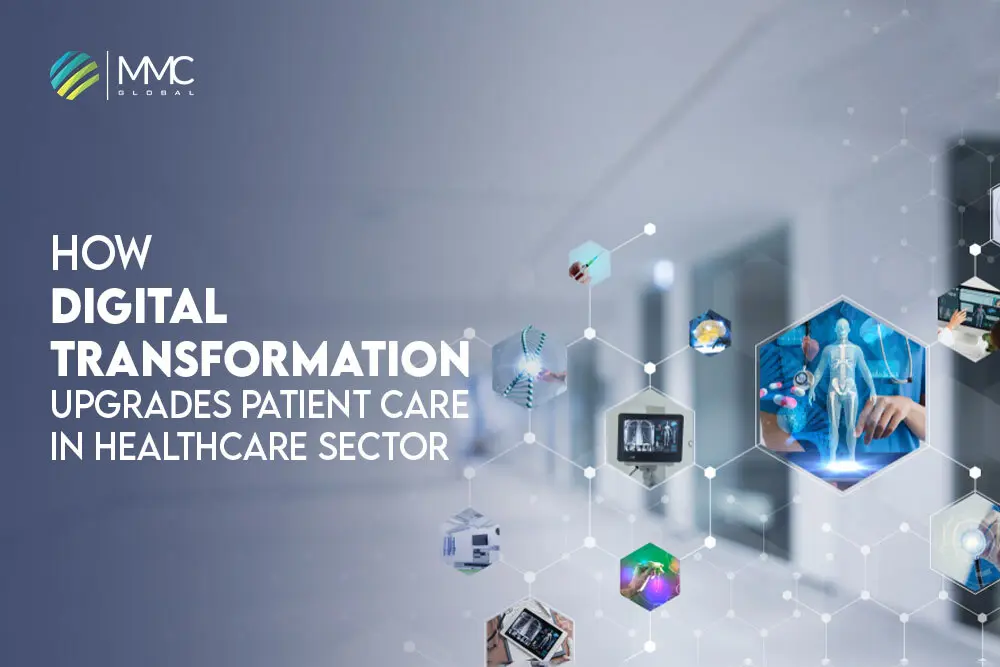How Digital Transformation Upgrades Patient Care in Healthcare Sector


Among all industries, digital transformation in healthcare has a higher success rate in improving patient care and healthcare institutions. The transformation we have experienced in today’s treatment and diagnosis is much better than our traditional healthcare system. This is only due to the implementation of technologies in major areas such as detecting anomalies, real-time diagnosis, patient interaction, telemedicine, etc.
However, digital transformation solutions in the healthcare sector bring diverse evolution that provides an ease to healthcare facilitators and patients. Implementing a digital transformation strategy helps overcome ever-evolving challenges such as the COVID pandemic, global incidents, or healthcare emergencies.
In fact, companies that provide digital transformation strategies and solutions are more likely engaged in custom software development, automated unified solutions like ERPs, custom mobile app development, web applications, etc.
Read more: Digital Transformation in Healthcare – Improving Patient Care
At MMC Global, we are proficient in developing and implementing healthcare solutions to streamline routine dealings, data management, and staff management. Moreover, we have customized software and apps that simplify hospital management and upgrade legacy systems with modernized solutions.
Let’s further move to know the key areas where digital transformation impacts exceptionally in the healthcare sector.
Key Areas of How Digital Transformation Impacts Healthcare
Improve Workflow
With digital transformation solutions in healthcare, institutions can manage day-to-day patient care, eliminate paperwork, reduce workload, and save time. It also maintains the decorum of the healthcare system with greater efficiency by managing patient appointments, simplifying the payment process, and storing patients’ records.
Virtual Appointments
COVID taught us how to help and serve people through contactless and physical interaction. No matter in which nation you are, you can make virtual appointments with doctors and get online consultations without investing time, sitting in long queues, and spending a lot of money. In fact, the inclusion of online interaction made healthcare providers’ and patient life easier.
Data Management
Healthcare institutions are dealing with piles of data such as patient information records, invoice generation, maintaining medical insurance data, and releasing medical reports. To do these tasks manually needs a high level of efficiency with less human error. However, managing the whole data manually can be risky without digitalization. With the help of digital transformation, healthcare institutions can go for custom software development, ERPs, custom mobile app development, and other automation solutions that keep healthcare operations fast and efficient.
Instant Communication
Implementing an AI chatbot eliminates the communication gap and instantly responds to your patients’ queries. Even booking appointments and getting first aid is possible with Chatbot as it develops well-trained algorithms to work 24/7 and is always available for patient help.
Wearable Technology
One of the most demanded and useful digital transformation solutions is wearable devices. It also helps to monitor patient health, promote proactive healthcare, reduce emergency risk, etc. In addition, wearable devices generate real-time data and transfer it to doctors for instant action. For example, a smart wearable device monitors blood pressure and pulses, and when any causality occurs, you can easily notify in-app.
Mobile Healthcare Apps
These are the handiest yet most engaging digital transformation solutions to get access to nearby hospitals and instant connection with health practitioners. In fact, many healthcare institutions launch custom mobile app development to enhance the patient care experience. Moreover, there are many fitness apps that people are using to make their lifestyle healthy. It includes a workout app, a walking steps counter, medication reminders, and more.

Digital Transformation in Healthcare Sector
Technology is crucial in driving digital transformation in the healthcare industry. It revolutionizes how healthcare organizations operate, communicate, and deliver patient care. Here are some prominent use cases of how technology is driving digital transformation in healthcare:
Electronic Health Records (EHRs)
EHRs replace traditional paper-based records with digital versions. It enables healthcare providers to securely store, access, and share patient information. EHRs streamline workflows, improve data accuracy, and facilitate better collaboration among healthcare teams.
Telemedicine
Telemedicine leverages technology to provide remote medical services, consultations, and monitoring. It allows patients to connect with healthcare professionals through video conferencing, eliminating the need for physical visits. Telemedicine improves access to care, especially in rural or underserved areas, and reduces healthcare costs.
Internet of Medical Things (IoMT)
IoMT refers to interconnected medical devices, sensors, wearables, and other equipment that collect and transmit patient data. In fact, these devices can remotely monitor vital signs, medication adherence, and disease progression, enabling early intervention and personalized care.
Artificial Intelligence (AI) and Machine Learning (ML)
AI and ML algorithms analyze healthcare data to identify patterns, make predictions, and support clinical decision-making. They can also assist in diagnosing diseases, predicting patient outcomes, recommending treatment plans, and even aiding drug discovery.
Blockchain
Blockchain technology provides a secure and decentralized system for managing healthcare data. It enhances data privacy, security, and interoperability by ensuring that patient information remains tamper-proof and accessible to authorized parties. Blockchain also facilitates the secure sharing of health records between different healthcare organizations.
Precision Medicine
Precision medicine involves tailoring medical treatments and interventions based on an individual’s unique genetic, environmental, and lifestyle factors. Advanced technologies such as genomics, big data analytics, and AI enable healthcare providers to deliver personalized care, improving treatment outcomes and patient satisfaction.
Virtual Reality (VR) and Augmented Reality (AR)
VR and AR technologies are used for medical training, surgical planning, and patient education. They create immersive and interactive experiences, allowing healthcare professionals to practice complex procedures in a simulated environment and enabling patients to visualize their conditions and treatment options.
Health Apps and Wearables
The widespread availability of health apps and wearable devices has empowered individuals to take charge of their health. These tools enable users to track their fitness, monitor vital signs, manage chronic conditions, and receive personalized health recommendations. Furthermore, they promote preventive care and facilitate remote monitoring.
Data Analytics and Predictive analytics
Healthcare organizations are leveraging data analytics to gain insights from vast amounts of healthcare data. By analyzing historical data and patterns, predictive analytics can forecast disease outbreaks, optimize resource allocation, identify at-risk patients, and enhance population health management.

Robotic Process Automation (RPA)
RPA automates repetitive and rule-based tasks in healthcare administrative processes, such as claims processing, billing, and appointment scheduling. It reduces human errors, enhances efficiency, and frees healthcare professionals to focus on more complex and value-added activities.
These are just a few cases of how technology drives digital transformation in healthcare. As technology advances, we can think of further innovations and disruptions that will shape the future of healthcare delivery and patient outcomes.
Read more: Digital Transformation in Healthcare: Revolutionizing the way we Deliver Healthcare
Looking for Best Digital Transformation Solution
If you plan to implement a digital transformation solution, you must take advantage of us. We have strategies, solutions, and resources to make your creativity a reality. We provide enterprise-level ERPs, management software, mobile applications, and other business automation tools to improve efficiency, increase productivity, and safely manage data. Let’s go ahead with your project discussion and development.



